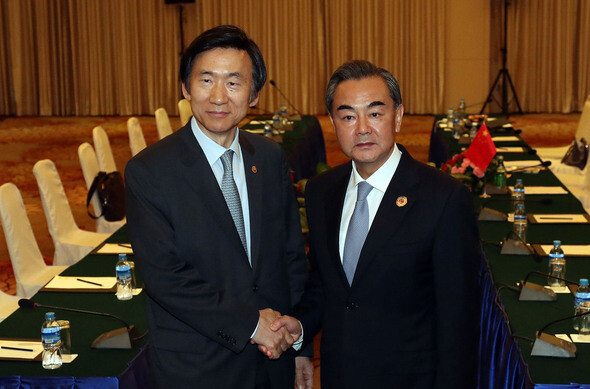hankyoreh
Links to other country sites 다른 나라 사이트 링크
At ASEAN forum, Chinese foreign minister says THAAD deployment harmed trust

During a meeting with South Korean Foreign Minister Yun Byung-se in the Laotian capital of Vientiane on July 24, Chinese Foreign Minister Wang Yi told his counterpart that South Korea’s recent behavior had harmed their reciprocal trust and that he was willing to listen to what meaningful action South Korea would take to preserve their relationship.
Wang’s remarks are provocative since they do not merely express opposition to the South Korean and American governments’ decision to deploy the THAAD missile defense system but go one step further by constituting a public request for South Korea to “correct” this decision.
Yun and Wang’s meeting took place as part of a series of meetings between foreign ministers connected with ASEAN (Association of Southeast Asian Nations) during the ASEAN Regional Forum, which is taking place in Laos from July 24 to 26.
This was the first meeting between high-level officials from the governments of South Korea and China since South Korea and the US announced that they would be deploying THAAD with US forces in South Korea.
On the afternoon of July 24, Wang arrived in Vientiane on the same airplane as North Korean Foreign Minister Ri Yong-ho.
On July 23, Ri traveled from Pyongyang to Beijing, where he stayed one day. On July 24, Ri and Wang boarded the same China Southern Airlines flight, which stopped at Kunming before continuing on to Vientiane.
Immediately after touching down in Vientiane, Wang Yi told reporters from various countries that he and Ri had “gave each other our regards.” This implies that Wang and Ri had a substantial conversation on their way to Vientiane.
When Ri departed Pyongyang on July 23, Chinese Ambassador to North Korea Li Jinjun took the unusual step of coming out to the airport to see Lee off.
North Korea and China also arranged for their delegations to stay at the same hotel, the Don Chan Palace Hotel. Of the 27 countries that are participating in the ASEAN Regional Forum, 10 countries (including North Korea and China) chose the Don Chan Palace Hotel. These 10 countries did not include South Korea, the US and Japan.
This unusual chumminess between the North Korean and Chinese delegations is worth watching since it could be interpreted as conveying a diplomatic message from the Chinese government, which has repeatedly expressed its opposition to the deployment of THAAD on the Korean Peninsula.
The series of conferences between foreign ministers at the ASEAN Regional Forum had been described as a diplomatic skirmish that could affect the future of geopolitics in Northeast Asia, which has been rocked by the dispute in the South China Sea, North Korea’s nuclear weapons and missile programs and the fracas over deploying THAAD with US forces in Korea. The conferences are also thought to be a litmus test that will show whether China will ease off its cooperation with [sanctions] against North Korea following the US and South Korean governments’ announcement about deploying THAAD.
By Lee Je-hun, staff reporter in Vientiane
Please direct questions or comments to [english@hani.co.kr]

Editorial・opinion
![[Column] Park Geun-hye déjà vu in Yoon Suk-yeol [Column] Park Geun-hye déjà vu in Yoon Suk-yeol](https://flexible.img.hani.co.kr/flexible/normal/500/300/imgdb/original/2024/0424/651713945113788.jpg) [Column] Park Geun-hye déjà vu in Yoon Suk-yeol
[Column] Park Geun-hye déjà vu in Yoon Suk-yeol![[Editorial] New weight of N. Korea’s nuclear threats makes dialogue all the more urgent [Editorial] New weight of N. Korea’s nuclear threats makes dialogue all the more urgent](https://flexible.img.hani.co.kr/flexible/normal/500/300/imgdb/original/2024/0424/7317139454662664.jpg) [Editorial] New weight of N. Korea’s nuclear threats makes dialogue all the more urgent
[Editorial] New weight of N. Korea’s nuclear threats makes dialogue all the more urgent- [Guest essay] The real reason Korea’s new right wants to dub Rhee a founding father
- [Column] ‘Choson’: Is it time we start referring to N. Korea in its own terms?
- [Editorial] Japan’s rewriting of history with Korea has gone too far
- [Column] The president’s questionable capacity for dialogue
- [Column] Are chaebol firms just pizza pies for families to divvy up as they please?
- [Column] Has Korea, too, crossed the Rubicon on China?
- [Correspondent’s column] In Japan’s alliance with US, echoes of its past alliances with UK
- [Editorial] Does Yoon think the Korean public is wrong?
Most viewed articles
- 1‘We must say no’: Seoul defense chief on Korean, USFK involvement in hypothetical Taiwan crisis
- 2Will NewJeans end up collateral damage in internal feud at K-pop juggernaut Hybe?
- 3[Column] Park Geun-hye déjà vu in Yoon Suk-yeol
- 4Why Korea shouldn’t welcome Japan’s newly beefed up defense cooperation with US
- 5Thursday to mark start of resignations by senior doctors amid standoff with government
- 6N. Korean hackers breached 10 defense contractors in South for months, police say
- 7[Guest essay] The real reason Korea’s new right wants to dub Rhee a founding father
- 8[Column] ‘Choson’: Is it time we start referring to N. Korea in its own terms?
- 9Kim Jong-un expressed ‘satisfaction’ with nuclear counterstrike drill directed at South
- 10[Editorial] New weight of N. Korea’s nuclear threats makes dialogue all the more urgent